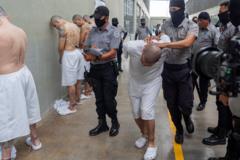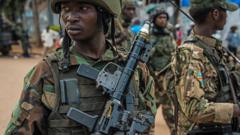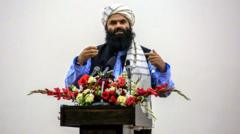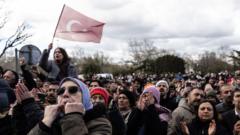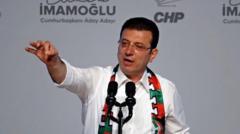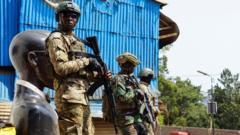The commutation of death sentences for three Americans involved in a coup attempt in the Democratic Republic of Congo represents a significant shift in the country's judicial proceedings, coinciding with a U.S. diplomatic visit amidst ongoing discussions about their imprisonment.**
Americans Sentenced Over DR Congo Coup Attempt Have Death Sentences Commuted**

Americans Sentenced Over DR Congo Coup Attempt Have Death Sentences Commuted**
Three Americans sentenced to death in a DR Congo coup attempt have had their sentences reduced to life imprisonment following a government decision.**
Three Americans who were sentenced to death for their involvement in a failed coup attempt in the Democratic Republic of Congo (DRC) last year have had their sentences commuted to life imprisonment, as announced by the country's presidency. These individuals, part of a total of 37 sentenced by a military court, were convicted for allegedly orchestrating attacks on the presidential residence and the dwelling of a political ally of President Félix Tshisekedi in May 2022.
The announcement of the sentence commutation comes just ahead of a visit by Massad Boulos, a senior U.S. advisor for Africa, to Kinshasa. Boulos, who is related to former President Donald Trump's family, is expected to address key strategic issues during his tour of multiple African nations, which include Rwanda, Kenya, and Uganda. While the U.S. has not labeled the Americans as wrongfully detained, prior communications between the State Department and DRC authorities indicate an ongoing dialogue regarding their status.
The Americans—Marcel Malanga Malu, Tyler Thompson, and Zalman Polun Benjamin—were convicted on charges including conspiracy and terrorism, which they have consistently denied. The purported head of the coup plot, Christian Malanga, a U.S. citizen of Congolese descent, died during the incident, as did five others involved.
Over the course of the military tribunal, a total of 51 defendants were processed; 14 were pronounced innocent and subsequently released. Death penalties have been practically nonexistent in the DRC for nearly two decades. Although the government lifted its moratorium on executions in March, it has yet to enact any death sentences since.
President Tshisekedi's decision to commute the sentences was confirmed by his spokesperson, Tina Salama, who labeled the clemency as an individual act for the three men. Their legal representation welcomed the news as a potential turning point.
The status of Jean-Jacques Wondo, a dual Congolese-Belgian national also sentenced to death, remains uncertain following his transfer to Belgium in February due to health concerns. The fate of other convicts, including a British, Belgian, and Canadian national, who were also sentenced to death, is still unclear as discussions unfold.
The coup attempt itself unfolded in Kinshasa in the early hours of May 19, when armed assailants targeting key political figures launched coordinated attacks on the president’s residence and other locations. Witness reports described a fierce exchange of gunfire, complicating the situation further.
This development has drawn attention not only for its implications on the individuals involved but also for the broader context of U.S.-DRC relations and human rights discussions following the attempted coup.



